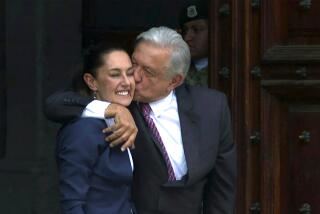Mexico’s PRI gets a new leader, vision
- Share via
MEXICO CITY — Former governor and federal lawmaker Beatriz Paredes today assumes leadership of the Institutional Revolutionary Party, which in the span of a decade sank from Mexico’s greatest political force to third-place finisher in last year’s presidential election.
Paredes takes over a party that still holds a majority of local and state offices, but is fractured by competing interest groups and politicians, and broad discontent among its formerly loyal base, Mexico’s 50 million poor.
Paredes, 53, said in an interview that she would lead a new, more democratic PRI, the initials the party is known by. She said she wanted to steer the PRI to the left, where presidential candidate Andres Manuel Lopez Obrador of the Democratic Revolution Party mined votes to come within a hair of winning the July election.
“You can’t judge the PRI of the past against the PRI of today,” she said. “My objective is to build a PRI of the 21st century.”
Her promises of consensus and unity, analysts say, are more pragmatic than ideological: Neither she nor any other Mexican leader has the power to select presidents and governors with the pointing of a finger, once the PRI’s prerogative.
The party began crumbling 10 years ago, when the PRI first lost its majority in Congress’ lower house. In 2000, the party lost its first presidential election in seven decades to former President Vicente Fox and the National Action Party, or PAN.
But the party still matters. Mexican President Felipe Calderon, who completes his first 100 days in office Saturday, will need cooperation from PRI lawmakers to pass legislative reforms such as creating a new national energy policy before Mexico’s oil runs dry, and figuring out how to get people to pay income taxes.
Mexico’s Congress is roughly split three ways among the PRI, Calderon’s PAN and Lopez Obrador’s left-leaning PRD. Calderon and Paredes were both lower-house party leaders during the first half of the Fox administration, and she said she expected a cooperative relationship with him now.
“We’ve always had a good dialogue,” she said.
During Fox’s six-year term, the PRI sometimes used its congressional votes to block reform proposals. Other times, Fox lacked the political will or skill to complete them. Paredes focuses on the latter. “Fox never took responsibility for his failures,” she said.
The PRI’s obstructionist policy in parliament is credited to Roberto Madrazo, who took over as party president in 2002 and essentially spent the next four years running for office. He lost badly in the presidential race.
Madrazo failed largely because voters found him untrustworthy. He also played hardball with rivals, alienating some party leaders who responded with tepid support for his campaign. Madrazo accused one would-be PRI candidate of corruption, a charge that evaporated days after the man dropped out of the party’s presidential primary.
“We’ve learned that a divided PRI is an electoral loser,” said Mariano Palacios Alcocer, the outgoing interim party president.
Madrazo defeated Paredes for the PRI leadership in 2002. This time, she won easily with the help of many old-line party leaders in a vote last month.
In the aftermath of PRI’s 2006 presidential trouncing, she’s seen by many party loyalists as a negotiator skillful enough to steer the PRI to the center-left. They hope her skills will give the party a shot at picking up seats during the 2009 midterm congressional elections and finding a polished contender for the 2012 presidential race.
A party activist since age 20, she studied sociology at Mexico’s National Autonomous University. She was governor of Tlaxcala from 1987 to 1992. Paredes served four terms in the lower house and one term in the Senate.
Among the groups she’ll have to win over are the party’s 17 governors, the most of any party. They hold much greater authority and influence than their U.S. counterparts. She also will have to build support in the party’s congressional bloc, which is divided among regional, union and ideological interests. And Mexico’s poor are angry about the country’s move from an economy of price-controlled staples and government-subsidized enterprises to a more freewheeling, open-market system.
“The party presidency of Beatriz Paredes is not going to be easy,” said Alfonso Zarate, a political analyst. “She’s going to have to maintain a fragile equilibrium among these distinct political forces, as well as those who helped her win.”
More to Read
Sign up for Essential California
The most important California stories and recommendations in your inbox every morning.
You may occasionally receive promotional content from the Los Angeles Times.













